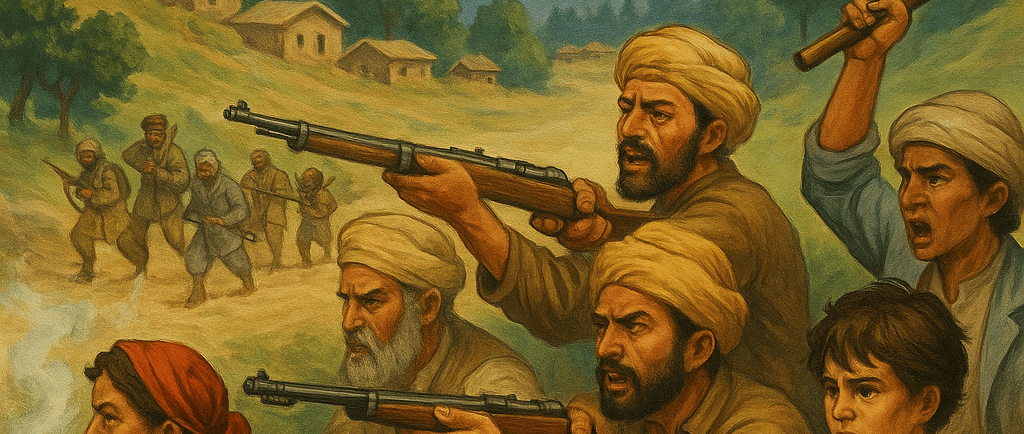When Villagers Became Warriors: The Heroic Defence of Poonch in 1947
In the grand narrative of 1947, when discussions revolve around Partition and the tribal invasion of Kashmir, Poonch often gets overlooked. But what happened there wasn’t just a skirmish. It was a people's war.
PATRIOTISM
Sahil Sharma
5/23/20252 min read


In October 1947, the peaceful valleys of Jammu & Kashmir were set ablaze.
Thousands of Pashtun tribal raiders, known as Kabalis, backed, trained, and armed by the Pakistan Army, crossed the border in a brutal, calculated invasion aimed at seizing the princely state before its formal accession to India.
Their rampage began with Muzaffarabad and quickly swept through Uri and Baramulla.
Baramulla Burned
What followed was a humanitarian nightmare.
Women were raped.
Children were slaughtered.
Religious places were desecrated.
Hospitals were looted and destroyed.
These weren’t just military strikes. These were massacres.
The next destination? Srinagar and then eventually… Jammu.
Poonch — The Unseen Roadblock
But before the raiders could get that far, they had to deal with a region they thought would fall easily: Poonch.
They couldn’t have been more wrong.
The raiders had underestimated a population of ex-servicemen, war veterans, and battle-hardened villagers, many of whom had served in World War I and II under the British Indian Army.
What followed was nothing short of a miracle of courage and resilience.
When the People Became the Army
There was no military garrison to protect Poonch in the initial days.
There were no armoured divisions, no air support, no artillery cover.
Just villages.
Ordinary people.
And an iron will to resist.
As the Kabalis advanced and tried to isolate Poonch by severing roads and bridges, the locals refused to yield.
Every house became a bunker.
Every village became a fortress.
Women cooked and supplied food.
Men fought with whatever weapons they had — old rifles, swords, even axes.
Children acted as runners and message carriers, navigating narrow goat trails through the hills.
The people of Poonch didn’t wait for help.
They became their own defenders.
Terrain, Courage, and Guerrilla Warfare
The raiders assumed they could crush the resistance by cutting off supplies.
But they had never faced a population that knew the mountains better than maps.
Locals used hidden forest trails to move food, weapons, and wounded fighters.
They created handmade bombs from discarded metal and gunpowder.
They organised into local militias, many commanded by retired Army men who trained the youth in basic warfare.
With knowledge of every rock and ridge, they waged a relentless guerrilla defence, ambushing raider patrols, destroying supply lines, and holding key points until reinforcements could arrive.
The Turning Point: Indian Army Airdrop
As the situation escalated, the Maharaja of Kashmir signed the Instrument of Accession with India, and the Indian Army was airlifted to Srinagar.
But reaching Poonch was still a logistical nightmare.
It was surrounded, with only narrow passes and dangerous terrain connecting it to the rest of the Valley.
In December 1947, the Indian Air Force began an air supply operation to drop rations and ammunition to Poonch.
Later in November 1948, a land corridor was finally secured by Indian troops under Operation Easy, which broke the siege.
Legacy of the Poonch Heroes
The people of Poonch had held off the raiders for over a year, relying almost solely on their willpower, local knowledge, and memories of war.
They held the line long enough for the Indian Army to reach.
They stopped the Kabalis from advancing toward Jammu.
They wrote a forgotten chapter of civilian resistance rarely seen in military history.
Why Poonch Matters
In the grand narrative of 1947, when discussions revolve around Partition and the tribal invasion of Kashmir, Poonch often gets overlooked.
But what happened there wasn’t just a skirmish.
It was a people's war.
A war fought not by soldiers in uniform—but by villagers in sandals, mothers in kitchens, and boys with slingshots.
And they held the line.
Poonch didn’t wait for rescue.
Poonch became the resistance.
